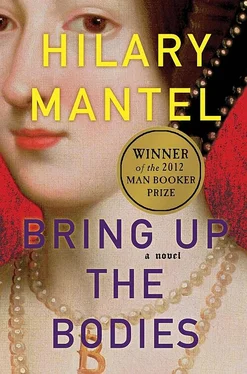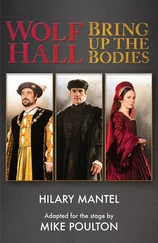But no, Henry cannot speak of his doubts in that quarter. Cranmer loves Anne, he thinks her the pattern of a Christian woman, the hope of good Bible readers all over Europe.
He sleeps again and dreams of the flowers made before the dawn of the world. They are made of white silk. There is no bush or stem to pluck them from. They lie on the bare uncreated ground.
He looks closely at Anne the queen, the day he brings back his report; she looks sleek, contented, and the benign domestic hum of their voices, as he approaches, tell him that she and Henry are in harmony. They are busy, their heads together. The king has his drawing instruments to hand: his compasses and pencils, his rules, inks and penknives. The table is covered in unscrolling plans, and in artificers’ moulds and batons.
He makes them his reverence, and comes to the point: ‘She is not well, and I believe it would be a kindness to let her have a visit from ambassador Chapuys.’
Anne shoots out of her chair. ‘What, so he can intrigue with her more conveniently?’
‘Her doctors suggest, madam, that she will soon be in her grave, and not able to work you any displeasure.’
‘She would come out of it, flapping in her shroud, if she saw the chance to thwart me.’
Henry stretches out a hand: ‘Sweetheart, Chapuys has never acknowledged you. But when Katherine is gone, and can no longer make trouble for us, I will make sure he bends his knee.’
‘Nevertheless, I do not think he should go out of London. He encourages Katherine in her perversity, and she encourages her daughter.’ She darts a glance at him. ‘Cremuel, you agree, do you not? Mary should be brought to court and made to kneel before her father and swear the oath, and there on her knees she should beg pardon for her treasonous obstinacy, and acknowledge that my daughter, and not she, is heir to England.’
He indicates the plans. ‘Not building, sir?’
Henry looks like a child caught with its fingers in the sugar box. He pushes one of the batons towards him. The designs, still novel to the English eye, are those he grew accustomed to in Italy: fluted urns and vases, mantled and winged, and the sightless heads of emperors and gods. These days the native flowers and trees, the winding stems and blossoms, are disdained for wreathed arms, for the laurels of victory, the shaft of the lictor’s axe, the shaft of the spear. He sees that Anne’s status is not served by simplicity; for more than seven years now, Henry has been adapting his taste to hers. Henry used to enjoy hedge wines, the fruits of the English summer, but now the wines he favours are heavy, perfumed, drowsy; his body is heavy, so sometimes he seems to block out the light. ‘Are we building from the foundations?’ he enquires. ‘Or just a layer of ornamentation? Both cost money.’
‘How ungracious you are,’ Anne says. ‘The king is sending you some oak for your own building at Hackney. And some for Master Sadler, for his new house.’
With a dip of his head he signals his thanks. But the king’s mind is up-country, with the woman who still claims to be his wife. ‘What use is Katherine’s life to her, now?’ Henry asks. ‘I am sure she is tired of contention. God knows, I am tired of it. She were better to join the saints and holy martyrs.’
‘They have waited for her long enough.’ Anne laughs: too loudly.
‘I picture the lady dying,’ the king says. ‘She will be making speeches and forgiving me. She is always forgiving me. It is she who needs forgiveness. For her blighted womb. For poisoning my children before they were born.’
He, Cromwell, flits his eyes to Anne. Surely now, if she has anything to tell, is the moment? But she turns away, leans down and scoops her spaniel Purkoy into her lap. She buries her face in his fur, and the little dog, startled from his sleep, whimpers and twists in her hands and watches Master Secretary bow himself out.
Outside waiting for him, George Boleyn’s wife: her confiding hand, drawing him aside, her whisper. If someone said to Lady Rochford, ‘It’s raining,’ she would turn it into a conspiracy; as she passed the news on, she would make it sound somehow indecent, unlikely, but sadly true.
‘Well?’ he says. ‘Is she?’
‘Ah. Has she said nothing still? Of course, the wise woman says nothing till she feels it quickening.’ He regards her: stony-eyed. ‘Yes,’ she says at last, casting a nervous glance over her shoulder. ‘She has been wrong before. But yes.’
‘Does the king know?’
‘You should tell him, Cromwell. Be the man with good news. Who knows, he might knight you on the spot.’
He is thinking, fetch me Rafe Sadler, fetch me Thomas Wriothesley, send a letter to Edward Seymour, whistle up my nephew Richard, cancel supper with Chapuys, but don’t let our dishes go to waste: let’s invite Sir Thomas Boleyn.
‘I suppose it is to be expected,’ Jane Rochford says. ‘She was with the king for much of the summer, was she not? A week here, a week there. And when he was not with her, he would write her love letters, and send them by the hand of Harry Norris.’
‘My lady, I must leave you, I have business.’
‘I’m sure you have. Ah well. And you are usually such a good listener. You always attend to what I say. And I say that this summer he wrote her love letters, and sent them by the hand of Harry Norris.’
He is moving too fast to make much of her last sentence; though, as he will admit later, the detail will affix itself and adhere to certain sentences of his own, not yet formed. Phrases only. Elliptic. Conditional. As everything is conditional now. Anne blossoming as Katherine fails. He pictures them, their faces intent and skirts bunched, two little girls in a muddy track, playing teeter-totter with a plank balanced on a stone.
Thomas Seymour says at once, ‘This is Jane’s chance, now. He will hesitate no more, he will want a new bedfellow. He will not touch the queen till she gives birth. He cannot. There is too much to lose.’
He thinks, already perhaps the secret king of England has fingers, has a face. But I thought that before, he reminds himself. At her coronation, when Anne carried her belly so proudly; and after all, it was only a girl.
‘I still don’t see it,’ says old Sir John, the adulterer. ‘I don’t see how he’d want Jane. Now if it were my daughter Bess. The king has danced with her. He liked her very well.’
‘Bess is married,’ Edward says.
Tom Seymour laughs. ‘The more fit for his purpose.’
Edward is irate. ‘Don’t talk of Bess. Bess would not have him. Bess is not in question.’
‘It could turn to good,’ Sir John says, tentative. ‘For until now Jane’s never been any use to us.’
‘True,’ Edward says. ‘Jane is as much use as a blancmange. Now let her earn her keep. The king will need a companion. But we do not push her in his way. Let it be as Cromwell here has advised. Henry has seen her. He has formed his intent. Now she must avoid him. No, she must repel him.’
‘Oh, hoity-toity,’ old Seymour says. ‘If you can afford it.’
‘Afford what’s chaste, what’s seemly?’ Edward snaps. ‘You never could. Be quiet, you old lecher. The king pretends to forget your crimes, but no one really forgets. You are pointed at: the old goat who stole his son’s bride.’
‘Yes, hold your peace, Father,’ Tom says. ‘We’re talking to Cromwell.’
‘One thing I am afraid of,’ he says. ‘Your sister loves her old mistress, Katherine. This is well known to the present queen, who spares no opportunity for harshness. If she sees that the king is looking at Jane, I am afraid she will be further persecuted. Anne is not one to sit by while her husband makes a – a companion – of another woman. Even if she thought it a temporary arrangement.’
Читать дальше
Конец ознакомительного отрывка
Купить книгу












